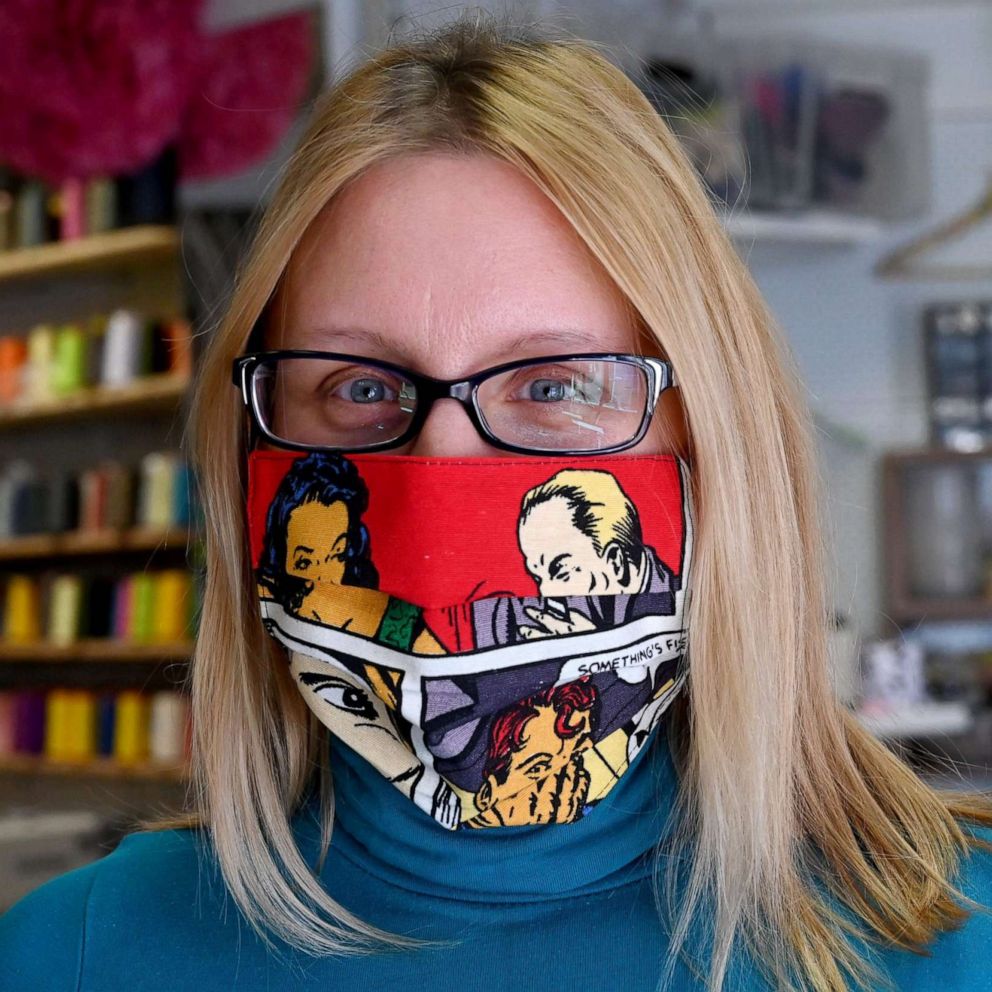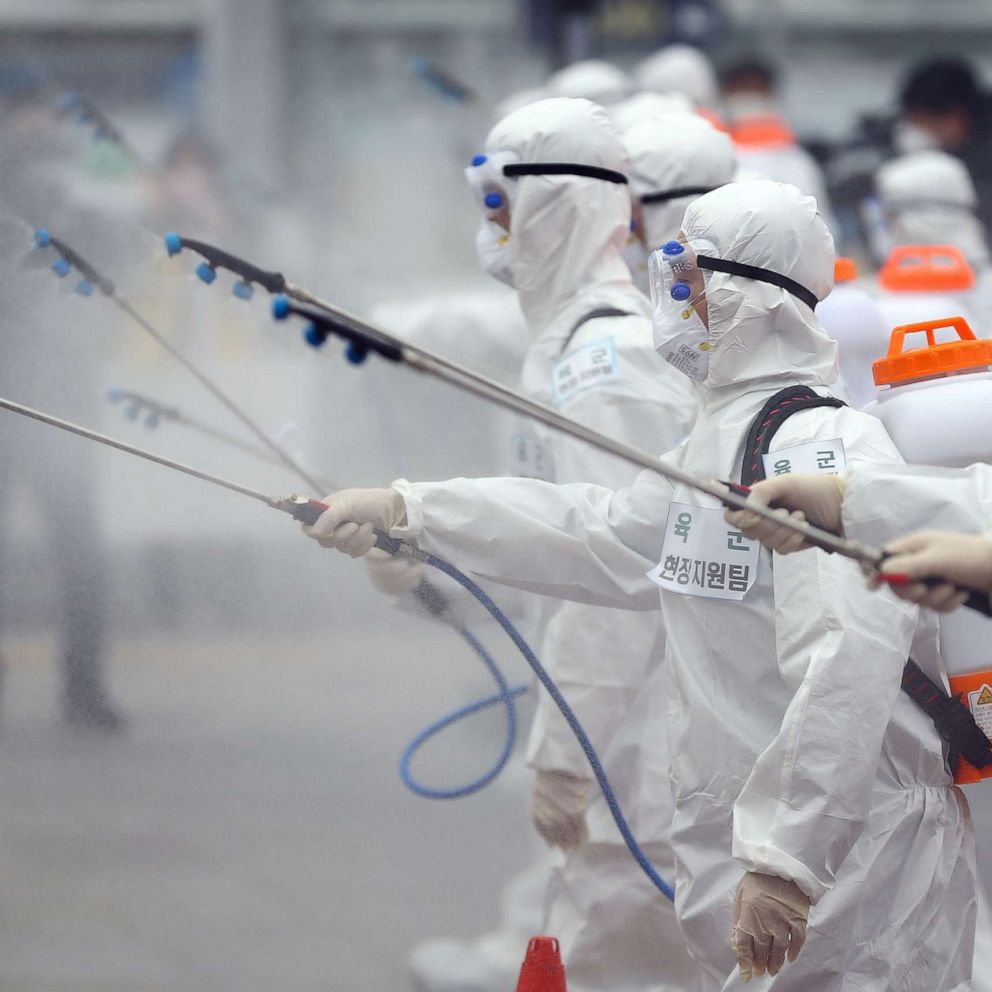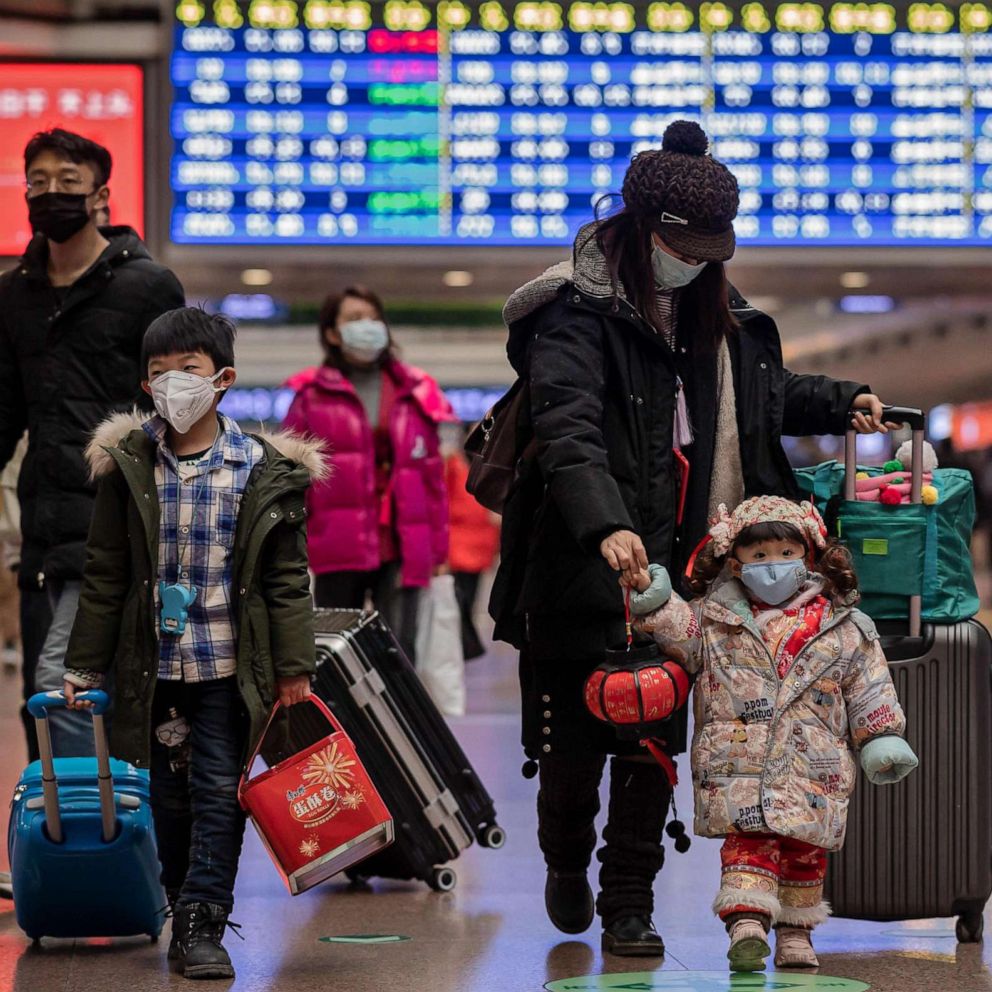Coronavirus government response updates: 'Biggest decision of my life,' Trump says, about reopening country
"It could lead to death, but staying at home leads to death, also," he said.
As the Easter weekend begins, President Donald Trump will likely not see the "packed churches" he envisioned last month.
While he has not given a specific date calling for an "opening up" of the country, the focus of the economic task force being set up by the White House is to find ways to have large sections of the U.S. open by May 1, administration officials have told ABC News.
The president has continued to predict the country will quickly return to normal and bounce back like never before, but he has limited say in when and how that could begin. Many governors have instituted stay-at-home orders and other lockdowns until at least June.
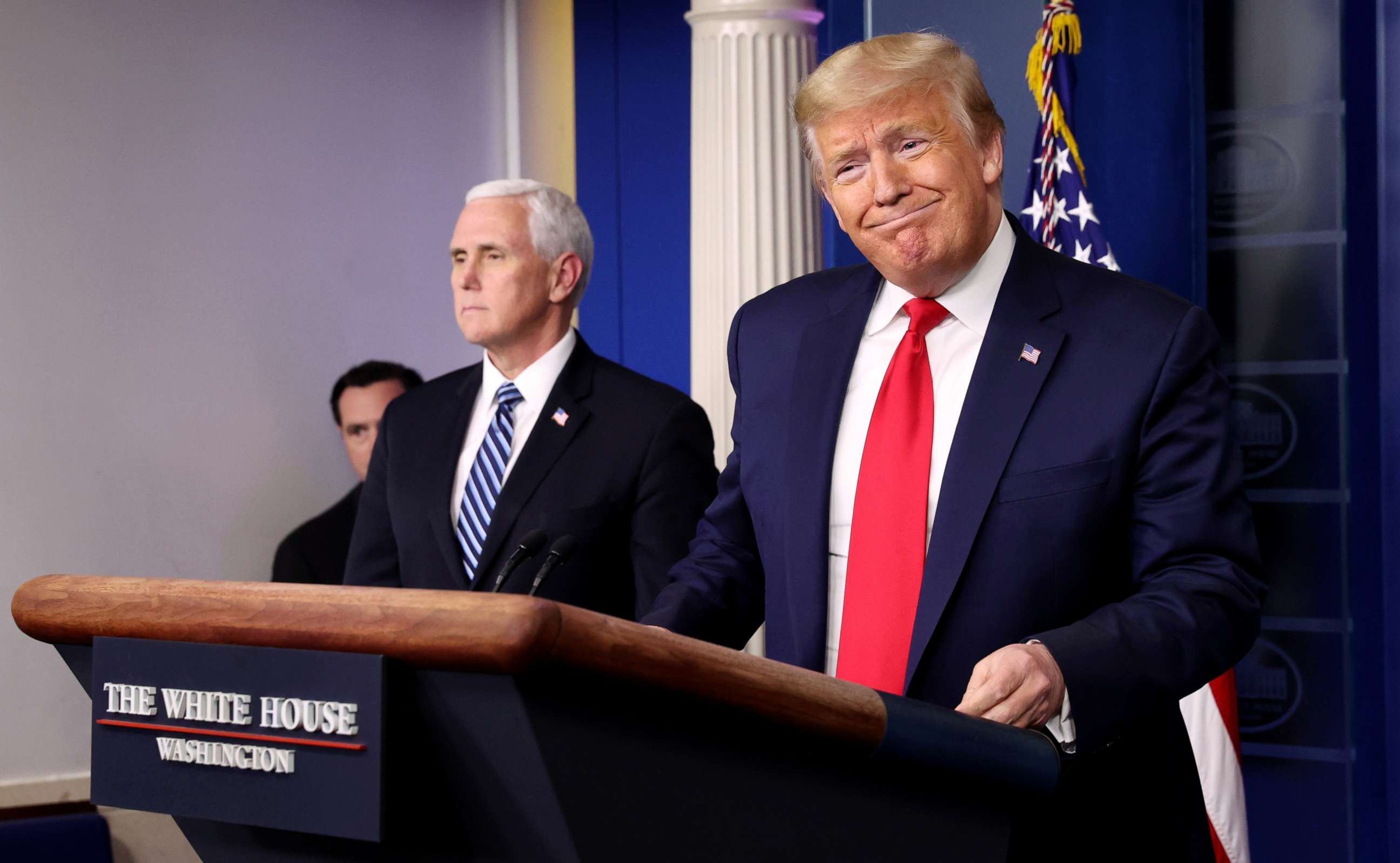
And Dr. Anthony Fauci, the government's top expert on infectious diseases, has cautioned that the virus dictates the timeline and warned that to "gradually" reopen the country widespread testing must be in place, so doctors can better identify, isolate and trace cases.
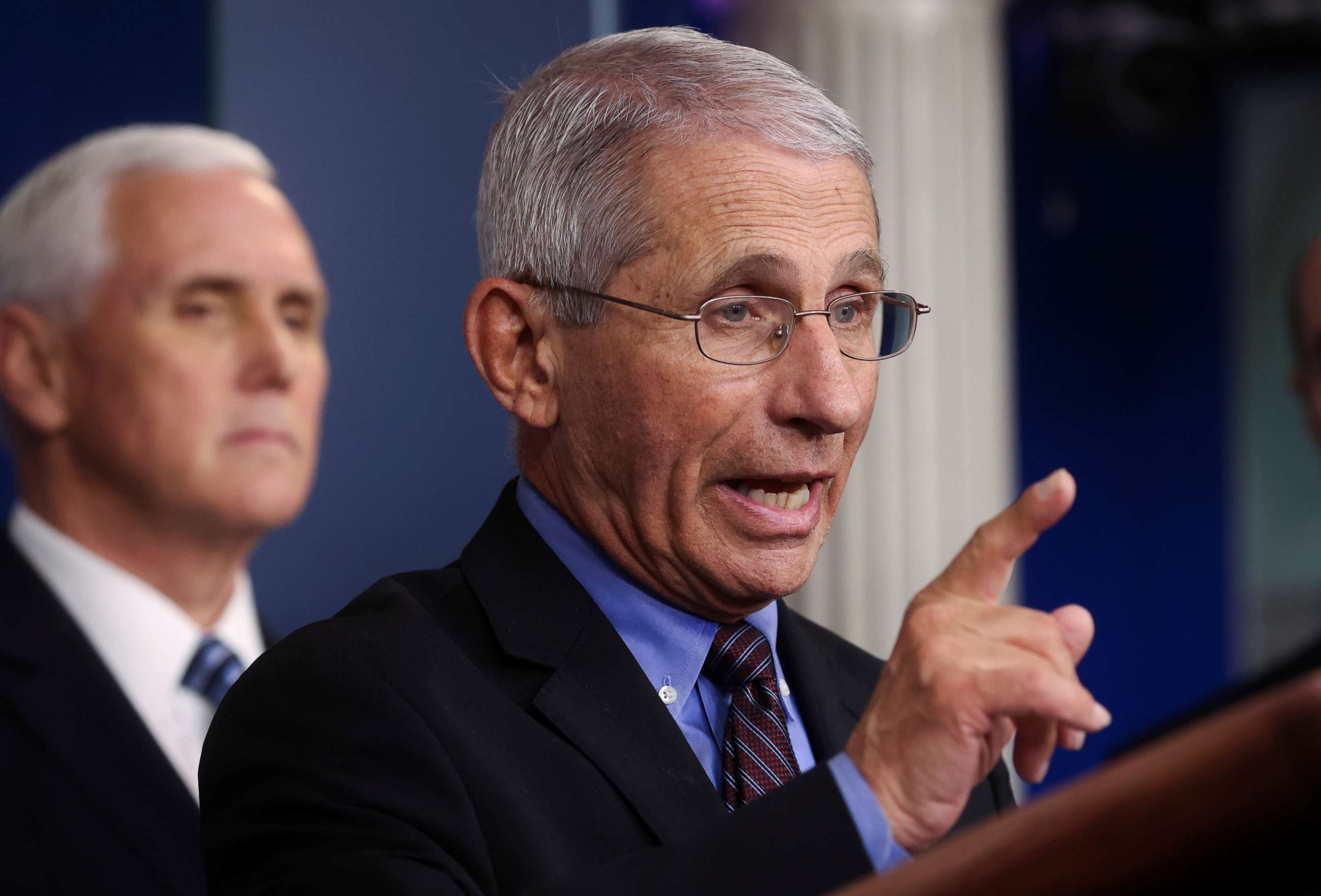
Asked about the need for nationwide testing in order to send Americans back to work at Thursday's briefing, the president largely dismissed the question, touting the country's testing of two million people "a milestone anywhere," while saying that testing all 325 million Americans is impractical and "not gonna happen."
"We want to have it and we're going to see if we have it. Do you need it? No. Is it a nice thing to do? Yes," the president said.
Tune into ABC at 1 p.m. ET and ABC News Live at 4 p.m. ET every weekday for special coverage of the novel coronavirus with the full ABC News team, including the latest news, context and analysis.
Here are Friday's most significant developments in Washington:
- Trump says reopening country will be 'biggest decision of my life,' but 'could lead to death'
- Trump says US headed to death toll 'substantially below' 100,000
- Trump confirms he's creating a task force or 'council' focused on reopening the country by May 1
- Fauci cautions a 'gradual' return to normalcy with widespread testing
- Surgeon General to communities of color: 'We need you to step up'
Here are the latest developments in the government response:
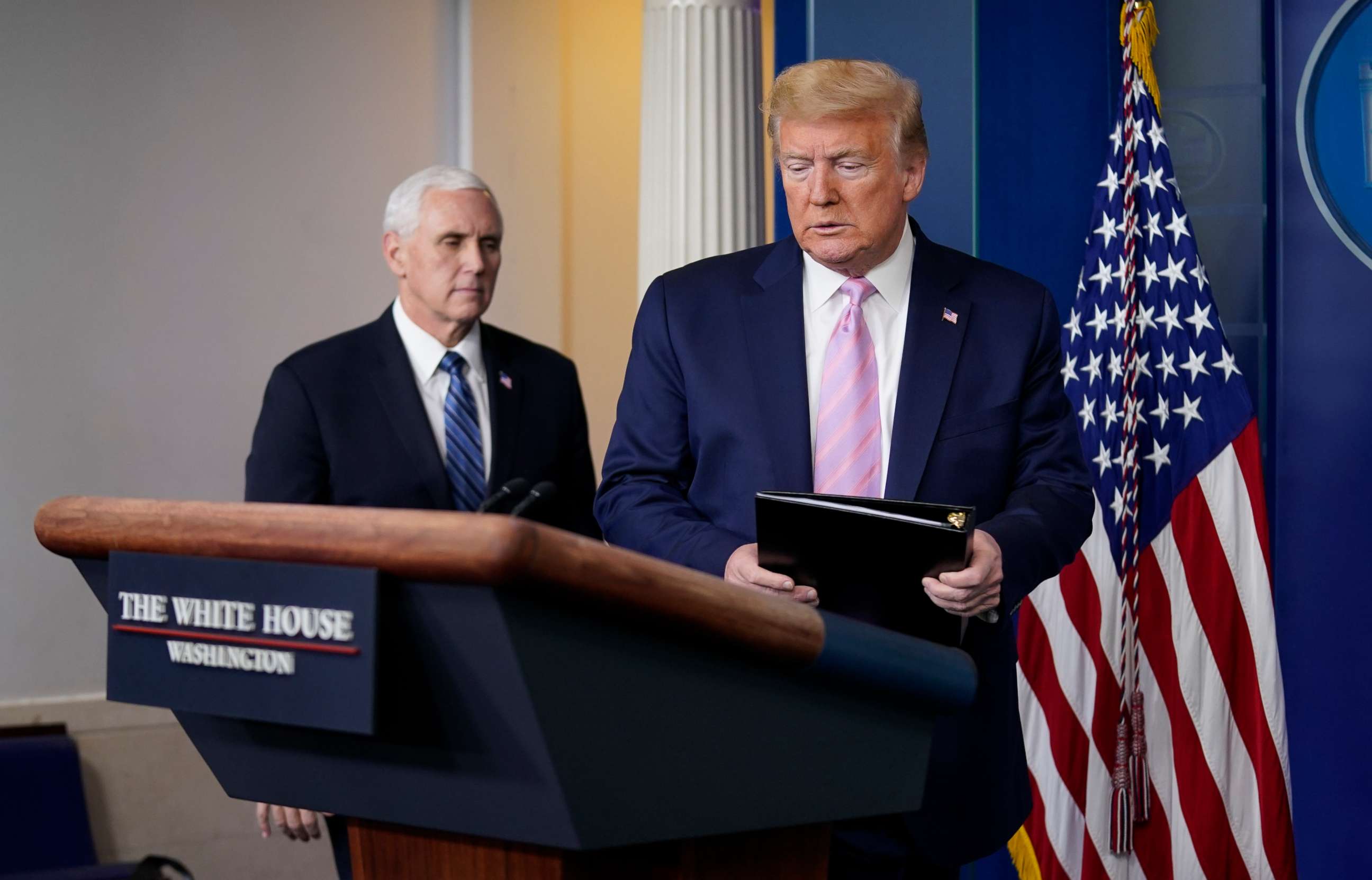
Trump says US headed to death toll 'substantially below' 100,000
Having come from a short Easter blessing in the Oval Office, President Donald Trump opened Friday's briefing by acknowledging faith amid the coronavirus pandemic.
"At this holy time, we pray that God will heal the sick and comfort the heartbroken, and bless our heroes. As American families look forward to Easter, we are reminded that our story ends not in despair but in triumph and renewal. Very appropriate, isn't it?," Trump said.
"I would like to provide an update on our ongoing efforts in the war against the invisible enemy," he continued.
The president's Good Friday message comes as sources tell ABC News the president, in internal deliberations, has now staked out a strategy to reopen large sections of the country by May 1, even as he has held back from publicly stating a goal date.
President Trump again noted how the COVID-19 death toll is on track to be closer to 60,000 by August, according to one key model, saying it's "substantially under" what the White House had originally projected -- between 100,000 and 240,00 American lives.
"I think we will be substantially under that number. Hard to believe that if you had 60,000 -- You can never be happy, but that's a lot fewer than we were originally told and thinking," Trump said. "It looks like we're headed to a number substantially below the 100,000. That would be the low mark and I hope that bears out."
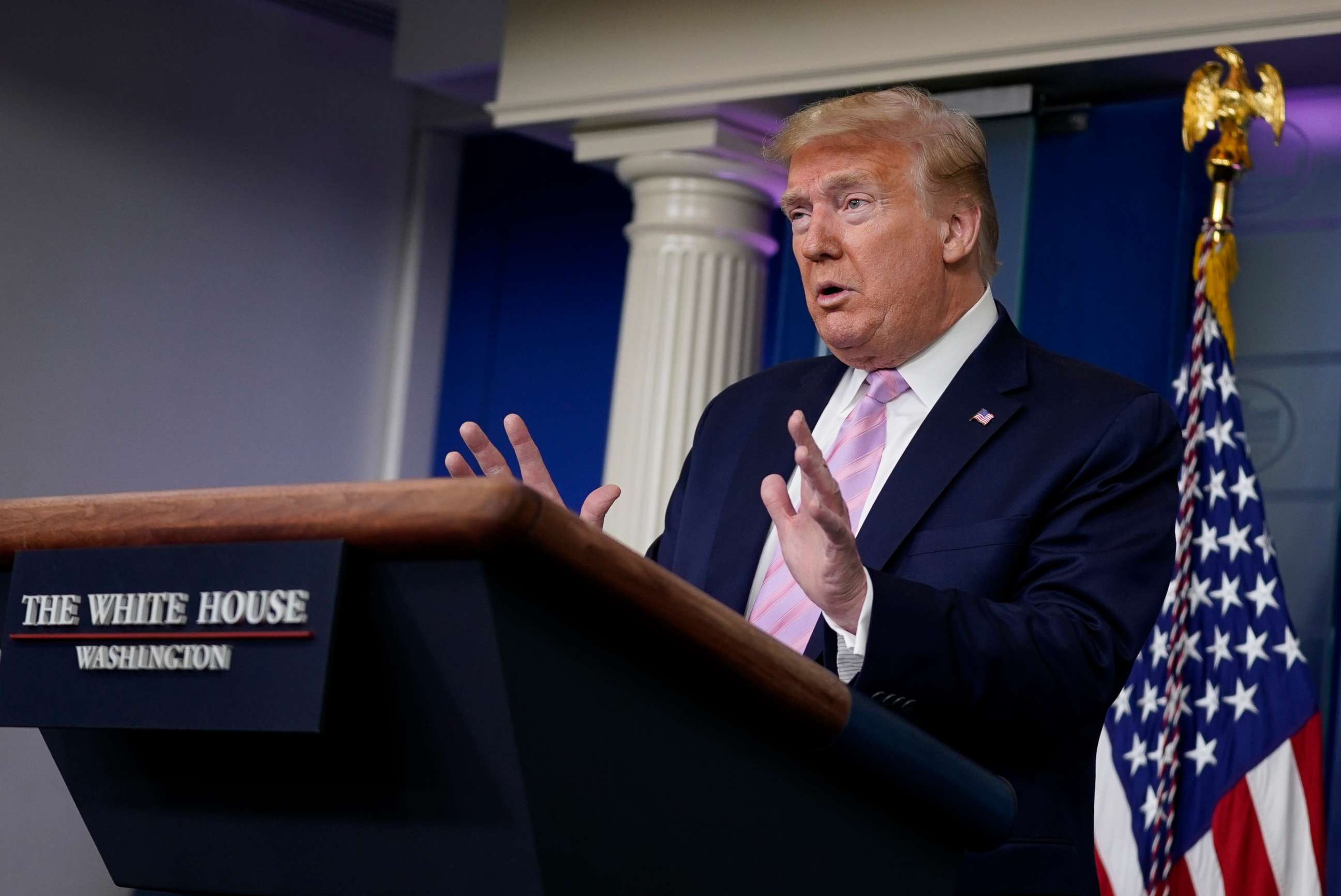
He said that his administration was "closely monitoring the data on the virus's impact on our cherished African-American communities, because they've been hit hard."
Black communities have been infected and their residents killed at a disproportionate rate across the country, according to several states' analysis of data.
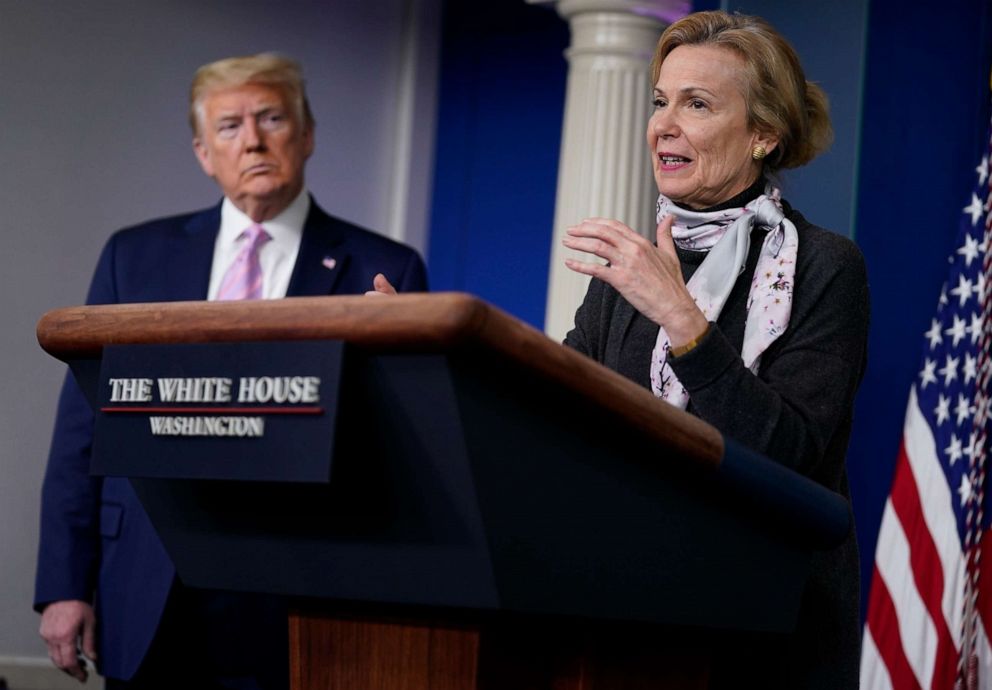
Birx, Fauci say cases starting to level out but warn mitigation must continue
Speaking after the president, White House coronavirus response coordinator Dr. Deborah Birx said that the increase in coronavirus cases in the United States was beginning to level out.
"You can see for the first time that in the United States, we're starting to level on the logarithmic phase, like Italy did about a week ago," she said.
But Birx cautioned that while some areas are seeing a leveling, the U.S. has not reached its peak, so everyone should keep up mitigation measures.
"As encouraging as they are," Birx said, of the signs they see that Americans are social distancing, "we have not reached the peak. Every day we need to continue to do what we did yesterday and the week before and the week before that. That is what, in the end, is going to take us up across the peak and down the other side."
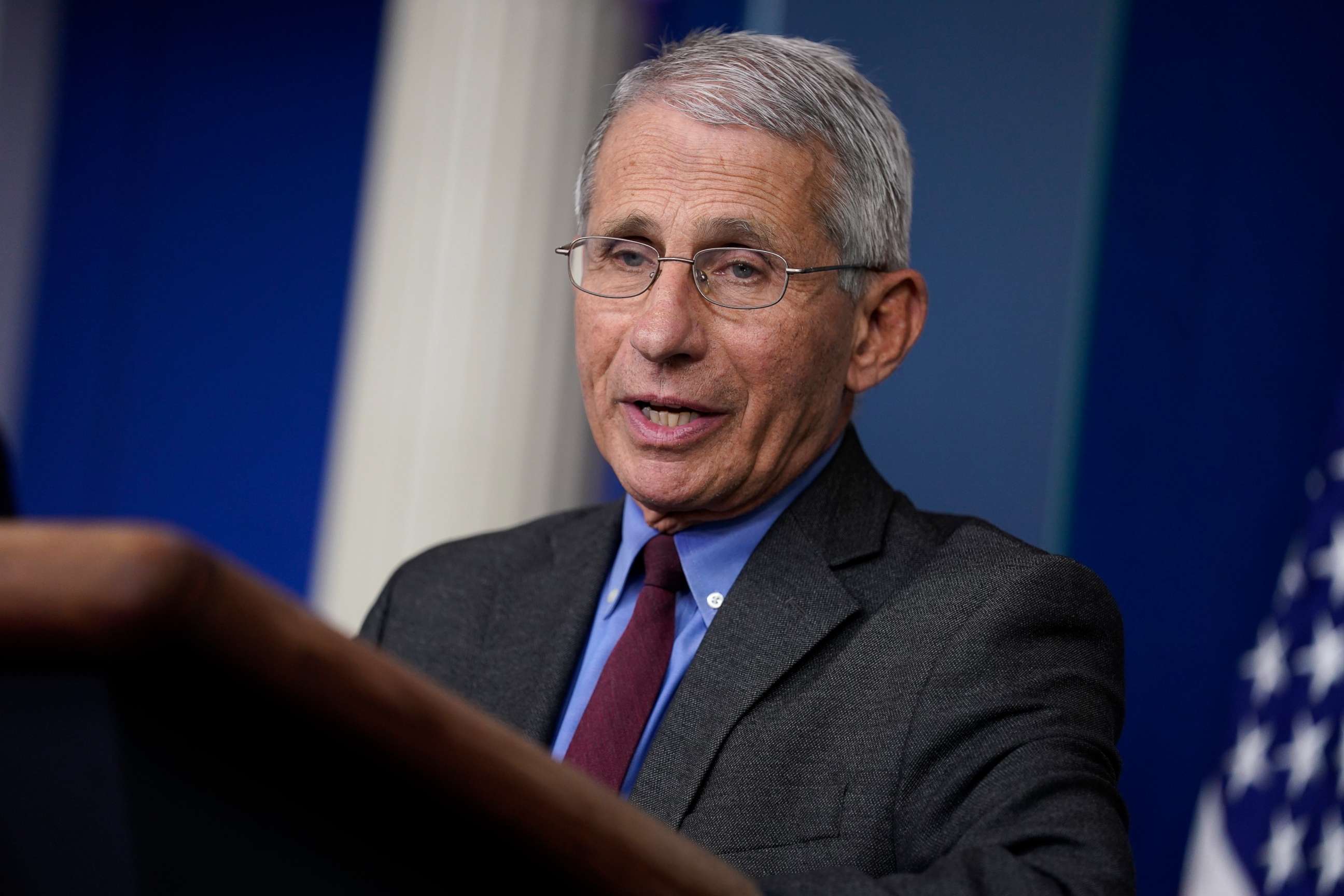
Dr. Anthony Fauci reminded Americans of the task force's prediction that this would be a fatal week and also emphasized social distancing.
"This is the end of the week, that famous week that we spoke about last weekend, in which we saw what actually was predicted to happen happened. We're starting to see the leveling off," Fauci said.
"But it's important to remember that this is not the time to feel that, since we have made such important advances in the sense of success of the mitigation, that we need to be pulling back at all," he added.
Vice President Mike Pence said that despite the increasing death count from coronavirus, "there's hope."
"On this Good Friday we we remember those who lost their lives to the coronavirus," he said.
"It's also good day to remember that Good Friday is always followed by Easter Sunday. There is hope. There is hope in this moment that thanks to what the American people are doing every day," he added.
Adams says task force working on 'targeted outreach' to minority communities
Surgeon General Jerome Adams directly addressed why black Americans are disproportionately contracting and dying from COVID-19 and what the administration is doing to address it.
"It's alarming but not surprising people of color have greater chronic health conditions," Adams said, before explaining that it's much more complex than that.
Broadly speaking, he said, communities of color are more likely to be exposed to COVID-19 and more likely to have complications -- because of many reasons. He said they are more likely to live in multi-generational households, less likely to have jobs where social distancing is an option, and, pointing to Native American tribal nations, said some don't have access to running water for effective hand washing.
"Let me be crystal clear," Adams said. "We do not think people of color are biologically or genetically predisposed to get COVID-19. There's nothing inherently wrong with you, but they are socially predisposed to coronavirus exposure, and they have higher estimates of the various applications of coronavirus."
Noting that more details are forthcoming, Adams said the task force is working "on data collection, targeted outreach, and increasing financial employment, education, housing, social and health support, so everyone has an equal chance to be healthy" specifically for minority communities.
"Avoid alcohol, tobacco and drugs," Adams added. "We need to understand, especially in communities of color, we need you to step up and help stop the spread so that we can protect those who are most vulnerable."
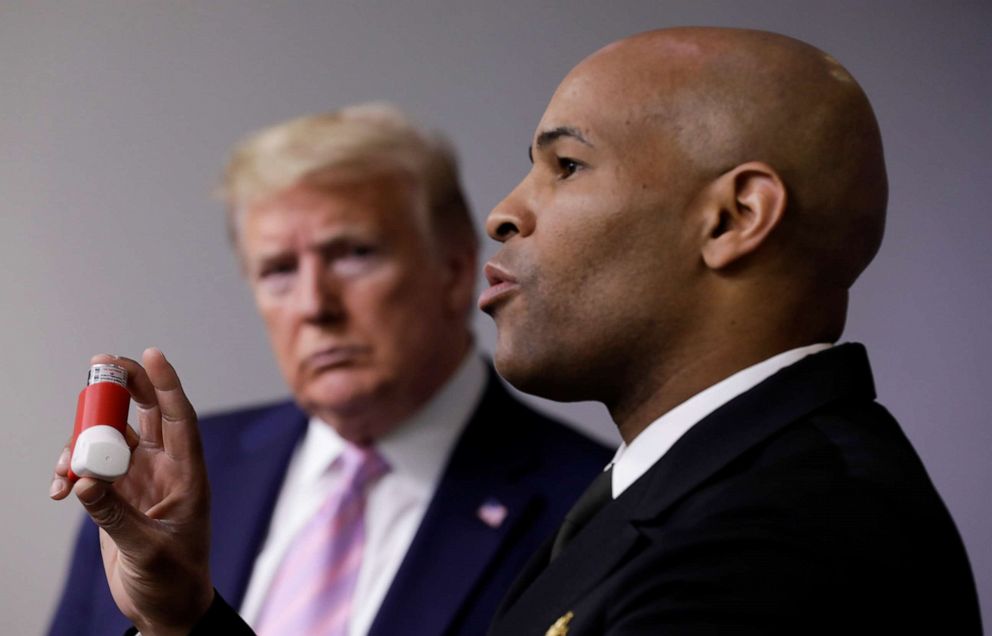
In a personal moment, Adams also revealed he's carried an inhaler in his pocket due to asthma for 40 years, saying, "I hope showing you this shows little kids with asthma that they can grow to be Surgeon General one day."
Vice President Pence also said that the CDC is currently working on new guidance to address the disproportionate affect coronavirus has had on minority communities.
Trump says some states could reopen without widespread testing
Asked what he would do if his own medical experts told him the country should not reopen on May 1, as the president is reportedly hoping to do, Trump said that he would "listen to them carefully" but noted there are "two sides" of that argument.
"I will certainly listen. There are two sides. I understand the other side of the argument very well. I look at both sides of an argument," Trump said.
"There is a tremendous pent-up demand. You see it this week," Trump added, pointing to gains in the stock market this week amid a volatile few month
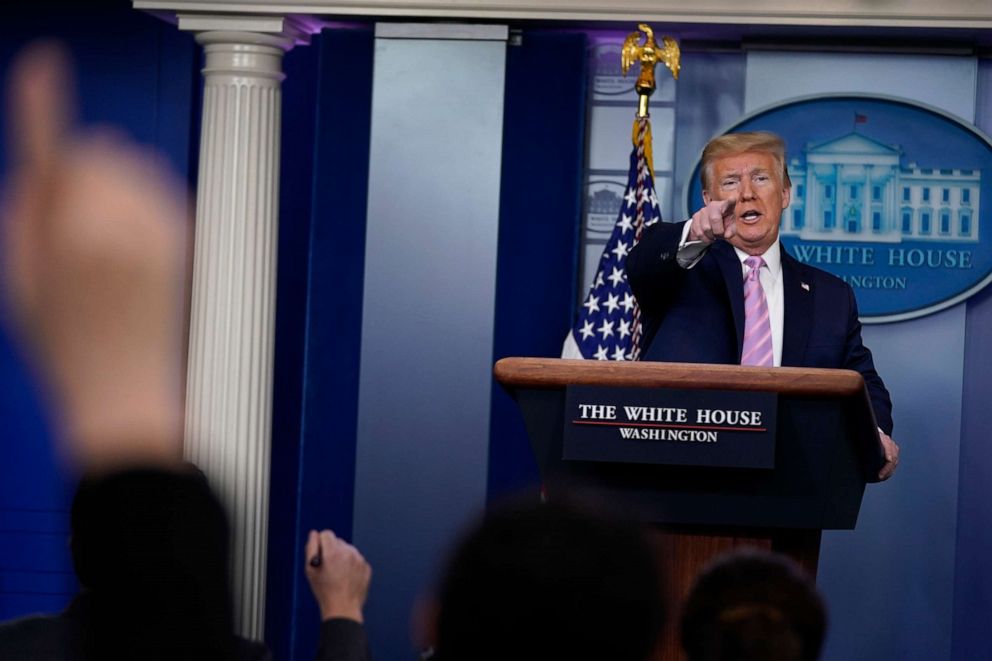
Asked if he would reopen the country without adequate nationwide testing, Trump insisted that areas with a lower number of cases don't need the same testing capacity as hot spots.
"There's not a lot of issues with testing," Trump began. "Certain sections -- we go to Iowa, Nebraska, and interestingly, Idaho is interesting. They had a few breakouts, but they are capable states, big distances, a lot of land. You don't need testing there. You know, where you have a state with a small number of cases, some states with almost none," Trump said.
"You don't have to test every person in the state of Iowa, as an example. You don't have to test every person to say 'Let's open up and get the tractors moving and let's get the corn,'" the president added. "That being said, if there is a little hot corner someplace, we will be testing."
"Biggest decision of my life," Trump says, about whether to reopen country
The president also confirmed that the White House is setting up a new council focused on reopening the country, as ABC News reported earlier this week. He did not call it an economic task force but an "opening of the country council."
"I call it the opening our country task force, or opening our country council, so we don't get confused with my task force," Trump said. "In it, we will have great business leaders, doctors, a great group of people."
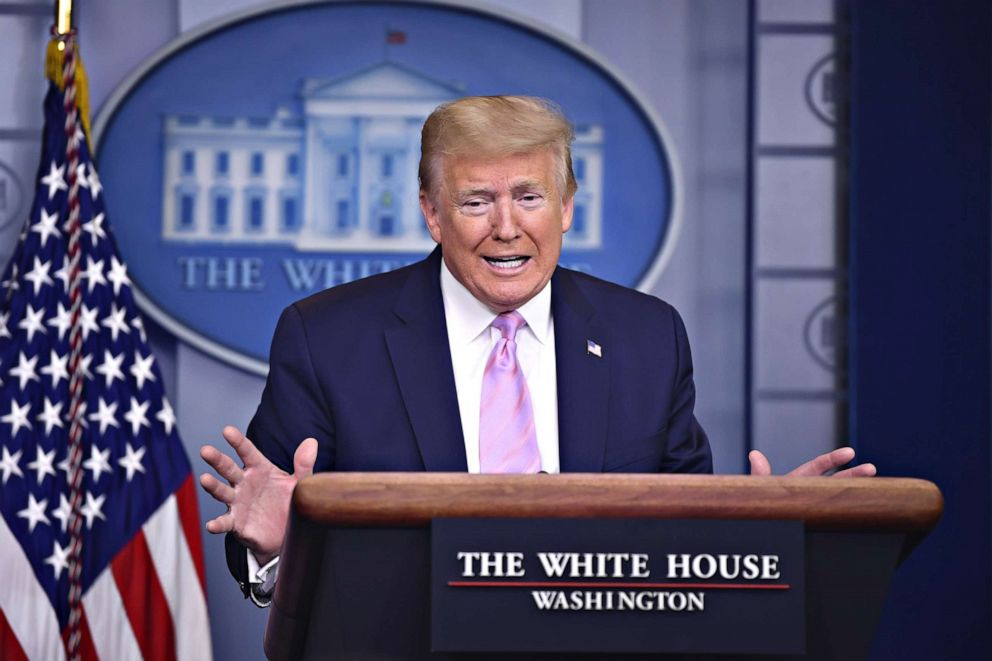
When asked about his thought process for reopening the country, Trump acknowledged that he can listen to dozens of experts, but ultimately, the the decision lies with him.
“The metrics right here,” he said, pointing to his head. That's my metrics. That's all I can do. I can listen to 35 people. At the end, I've got to make a decision," he said.
"I will have to make a decision, and I only hope to God it is the right decision. But I would say without question, it is the biggest decision I'll have ever had to make," he said.
"It's the biggest decision of my life," he repeated.
Treasury Secretary Steve Mnuchin, who sources say would be a key member of economic adviser group, has said he "absolutely" thinks it's possible for some businesses to be back up and running in May.
Asked about the potential for more deaths if the country is reopened too soon, the president claimed that staying at home leads to death, too.
"You are right about opening up, and it could lead to death, but staying at home leads to death, also," the president said.
"It is very traumatic for this country, but staying at home, if you look at numbers, that leads to a different kind of death perhaps, but it leads to death, also."
From earlier today:
Surgeon General says 'most of the country' will not be open by May 1
While the Trump administration reportedly eyes the date, Surgeon General Jerome Adams said Friday morning that most Americans will not be able to return to their normal lives on May 1, after the current White House social distancing guidelines are set to end April 30..
In an interview with Fox News Friday morning, Adams said the administration would be "data-driven" in determining when to reopen businesses around the U.S., echoing comments from Vice President Mike Pence at Thursday's briefing that the task force is assessing the spread of the virus on a "county by county" level.
"There are places around the country that have seen consistently low levels," Adams said. "And as we ramp up testing and can feel more confident that these places actually can do surveillance and can do public health follow-up, some places will be able to think about opening on May 1."
"Most of the country will not, to be honest with you, but some will," he continued, "And that's how we'll reopen the country: place by place, bit by bit, based on the data."
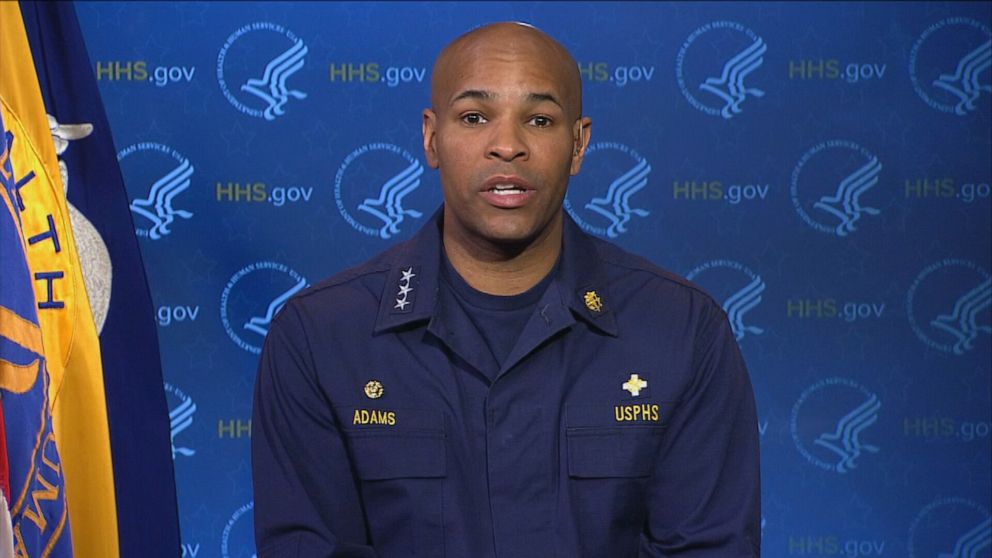
Treasury Secretary Steve Mnuchin, another high ranking Trump official, told CNBC Thursday he thinks it's "absolutely" a possibility, assuming the health crisis stabilizes, for businesses to be back up and running in May.
"I think as soon as the president feels comfortable with the medical issues, we are making everything necessary that American companies and American workers can be open for business and that they have the liquidity they need to operate their business in the interim," Mnuchin said.
Trump expected to issue prayer proclamation, encourage social distancing through holiday weekend
President Trump is set to issue a "prayer proclamation" on this Good Friday and call on Americans to maintain social distancing guidelines through the holiday weekend, a senior administration official tells ABC News.
It's an important message for President Trump to deliver considering he previously envisioned an Easter reopening where churchgoers would pack the pews in celebration.
The president has, of course, since reversed from that Easter goal, claiming he only meant ever meant it as an "aspirational" goal.
Bishop Harry Jackson will join the president for today's blessing event, scheduled for noon in the Oval Office.
ABC News' Jordyn Phelps
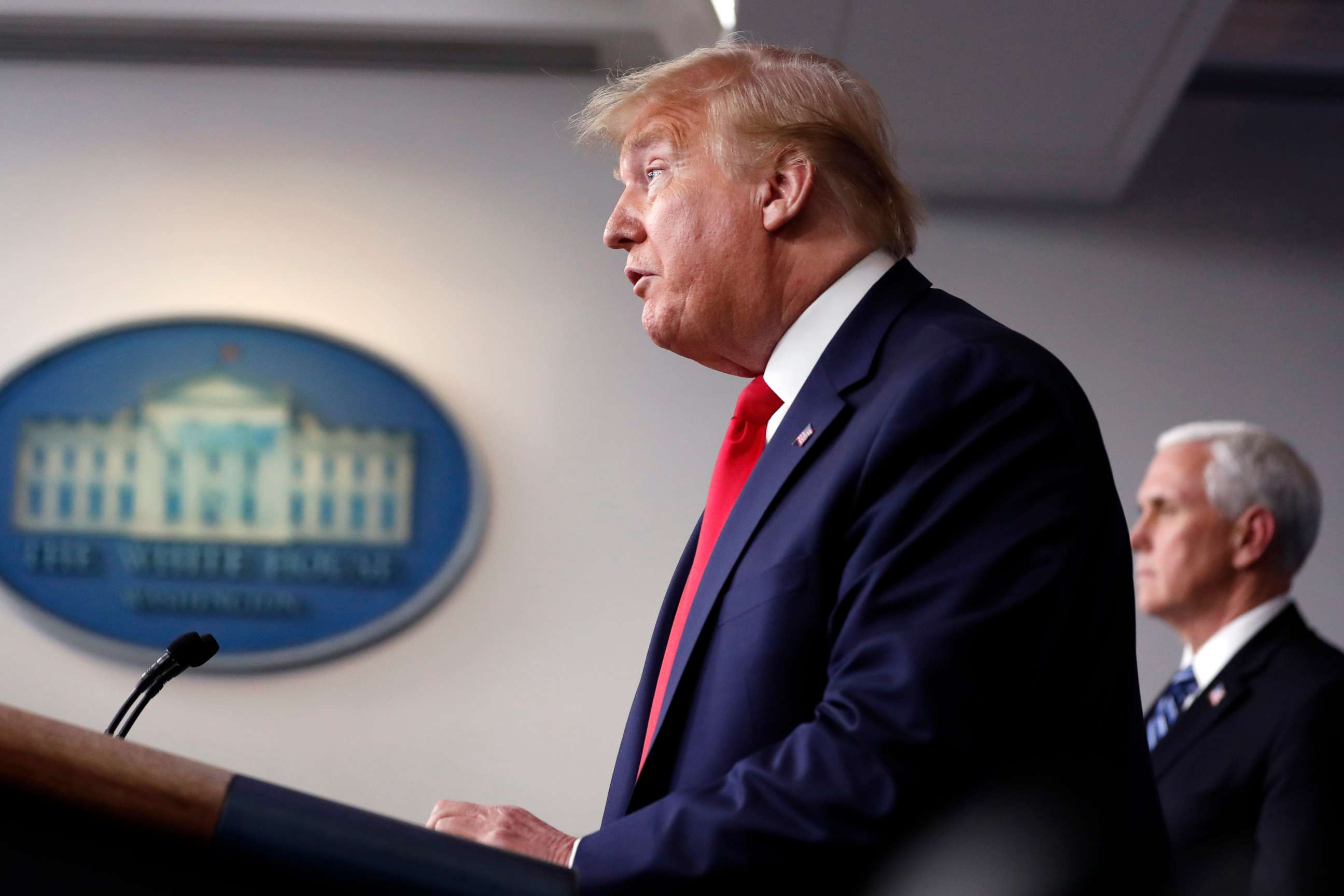
Fauci says US days away from widespread antibody testing
Dr. Anthony Fauci, the nation's top doctor on infectious diseases, said he believes the country is days away from having a large number of antibody tests available but emphasized the importance of properly validating before a widespread rollout.
"Within a period of a week or so, we are going to have a relatively large number of tests available," Fauci told CNN Friday morning.
He didn't rule out the possibility that Americans could at one point carry certificates of immunity, saying it's "possible."
Fauci also noted that the availability of antibody tests doesn't change the need for widespread testing to determine who was actively infected and infectious.
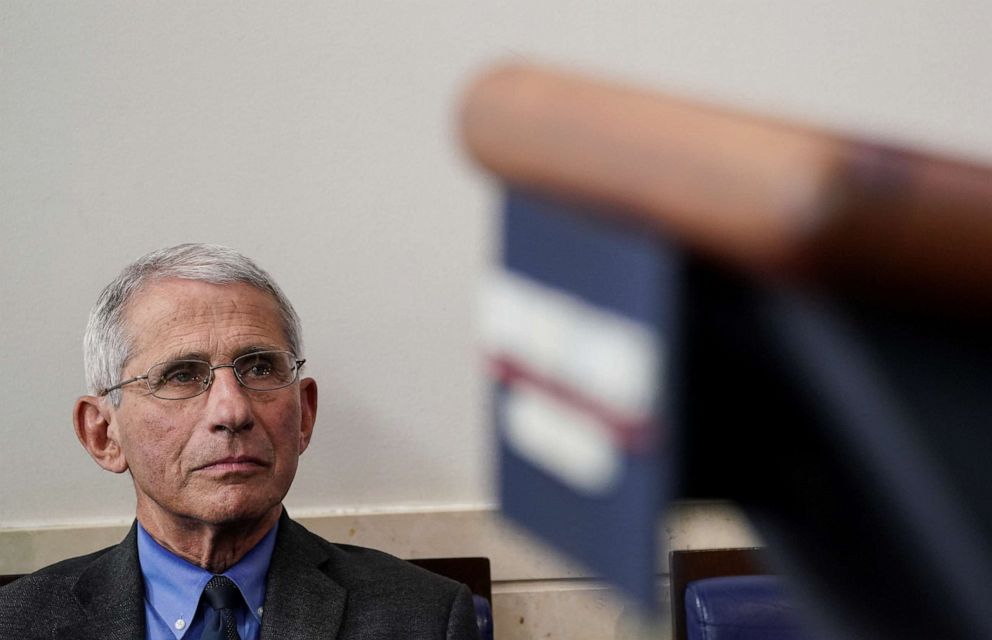
On the cusp of Easter weekend, Fauci urged Americans to adhere to federal social distancing guidelines.
"I know, particularly in a season like the Easter season and Passover, how difficult that is, but we really need to do it, because it is working," he said. "So even though we're in a holiday season, now is no time to back off. As I say so often, now is the time to actually put your foot on the accelerator. Because we're going in the right direction. Let's keep in that direction."
